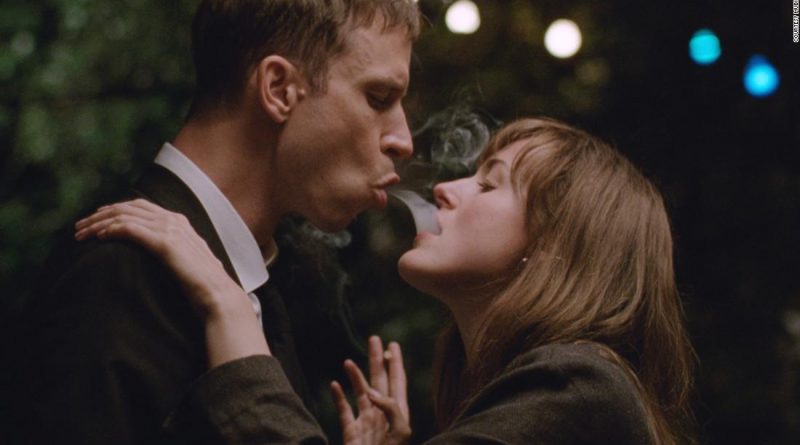Joachim Trier ripped up the rom-com script with ‘The Worst Person in the World.’ He could win an Oscar for it
Joachim Trier’s characters have a habit of taking a scalpel to their psyche. The reason for the incision ranges — a comment from a friend, a bad review, a breakup — but once it’s made, what starts as a keyhole operation can become open heart surgery and escalate into existential crisis. Not that the world is paying attention. Mostly life goes on and these characters find ways to sew themselves up, deriving strength in the knotty scar tissue that remains.
In “The Worst Person in the World,” the latest film by the Danish-born Norwegian writer-director, Julie, played by Renate Reinsve, feels like a spectator in her own life — “like I’m playing a supporting role,” she laments. That flailing sensation, of failing to feel like you’re the hero of your own story, haunts Julie. So too Erik, Philip and Anders, the main characters in Trier’s “Reprise” (2006) and “Oslo, August 31st” (2011), the other two films in what has been dubbed the director’s “Oslo Trilogy.”
Approaching 30, Julie is without a discernible career or long-term goals; caught between wanting security and not wanting to be defined by those who might provide it. It’s an emotional tightrope that has her feeling footloose when things are going well and rudderless when they are not.
Trier and co-writer Eskil Vogt, alongside Reinsve, and with Anders Danielsen Lie and Herbert Nordrum as Julie’s love interests Aksel and Eivind, have ripped up the script of the female-fronted romantic comedy. In its place they’ve made a film that’s sad, funny, deeply melancholy and equally uplifting, and one that has struck a chord with audiences and award bodies alike.
Ahead of the Oscars on March 27, where “The Worst Person in the World” is nominated for Best Original Screenplay and Best International Feature Film, CNN sat down with Trier to discuss his movie and how it connects with his earlier work.
The following interview has been edited for length and clarity.
Joachim Trier alongside Anders Danielsen Lie (left) and Renate Reinsve (right) on the set of “The Worst Person in the World.” Credit: Christian Belgaux/Mubi
CNN: I don’t know if you saw, but Paul Schrader (“The Card Counter,” “First Reformed”) said some lovely things about your film.
Trier: I did. Please read it again (laughs).
Yeah, completely. We’ve been asked a lot about the perspective of gender. We’ve had a tremendous amount of women responding that they identify with it, but men as well. I try to write what I hope are true characters; I don’t need to get caught in just thinking about representation. I want to try to look at the world and be a good observer and have empathy for people. Julie’s someone who becomes a friend, or someone that I identify with. It was also the same with Aksel.
You identify with parts of Julie and also Aksel —
And Eivind.
And Eivind. As someone who pours themselves into their characters, how do you feel when you put those characters in conflict?
That’s how I’m able to play around with things that I’m not quite resolved about. That’s why I’m making a film that at the outset seems like a romantic comedy and ended up being quite an existential pondering upon the limitations of time and the worries of the world.
What changed about Julie when Renate came on board?
The character automatically changes when she’s living it beat by beat. Every day she would make the character more interesting and more complex. There was really no moment when she read the script where she said, “Oh, this part is completely wrong.” She went with it. Mind you, I like actors to take authority over the character at some point. They can almost have secrets from me — things that I can observe, things that I can shoot, that I don’t quite need to know. I’ll never be able to describe it, but I can show it to you because I got it on film.

“There is a sense of self sabotage about (Julie),” said Trier. “But it’s also deeply human to yearn for more and be passionate and curious. I’m not interested in making art about idealized people.”
Credit: courtesy Mubi
Perception gaps are prevalent in the Oslo Trilogy. What’s your fascination with the gray area between the person we believe we are versus the person people see us as?
Since I was a kid, I’ve been curious about our sense of identity as something that’s a bit forced upon us. Maybe as a child, you play around with ways of speaking and what to wear. At some point, we’re supposed to stop. We’re supposed to let society define what we are so we can summarize it for practical reasons that are not always our own. I think even for a cis White male my age, I still find it problematic sometimes that there are such fixed notions about identity. I see that becoming an issue in many people’s lives.
I’m always on the side of imagination. Julie is a dreamer, and I know that sometimes you’ve got to face reality, because not all choices are open forever. I guess that’s a theme of this film that I can’t say anything smarter about, other than I really find that intriguing.

Hans Olav Brenner and Anders Danielsen Lie as Thomas and Anders in Joachim Trier’s “Oslo, August 31st.” Credit: TCD/Prod.DB/Alamy
I re-watched “Oslo, August 31st” before this. Thomas says to his friend, recovering addict Anders, “If you had to look at your life from the outside, if you had the time like you had, I think anyone would get depressed.” It strikes me that a few of your characters might describe themselves as “the worst person in the world.”
I sometimes get criticized — and maybe that’s fair — that people see my characters as very privileged, because their main goal isn’t to get a job and to make a living, it’s often to try to make life purposeful. Not all people have that time and space. But everyone has to deal with making sense of the time they have and deal with mortality. These things are deeply human, regardless of class or society.
There’s a point to what Thomas is saying. He has what is perceived in our society as a functioning family life and he’s living in a more conventional way. Anders is completely free, and that freedom has gotten the better of him. Anders says in the same scene, “I’m 34, but no one really needs me. If I passed away, it wouldn’t be a tragedy like you.” I feel that is an ongoing subject matter in my films: this wanting to mean something to someone, belonging to something and finding that complicated. It’s complicated for a lot of people.

“(I) realized, before I made ‘The Worst Person in the World,’ that I had been tracing the development of the city,” said Trier. Credit: courtesy Mubi
I need to ask about Oslo, because it’s much more than a backdrop. What was the story you were trying to tell of the city?
I felt a lack of representation of the Oslo that I’ve lived in. I didn’t know any filmmakers that really showed the parts of town I would want to bring into prominence in an image. But then I also realized, before I made “The Worst Person in the World,” that I had been tracing the development of the city. In “Oslo, August 31st,” Anders comes out of a tunnel when he goes from rehab into the city. You suddenly see this big building site. Ten years later, that’s where Eivind works in a coffee shop. That’s cinema: You’re reporting on a city developing in ways that are out of my control — you can’t do that in theater or in literature in the same way.

Anders Danielsen Lie and Espen Klouman-Høiner as the authors in Trier’s breakthrough movie “Reprise.” “We (Trier and co-writer Eskil Vogt) were equally anxious, not only to be successful, but what if we lost our friendship? All of those anxieties fueled that film,” said Trier. Credit: TCD/Prod.DB/Alamy
The way “Worst Person” is constructed with 12 chapters, it feels like it’s imposing structure on life in retrospect, and finding meaning through that structure. Looking back on the Oslo Trilogy, what have you learned about yourself on this journey that began with “Reprise”?
So much. In “Reprise,” the guys are so concerned with being formalist writers and are shameful about talking about anything biographical. “Reprise” revealed to me that I shouldn’t be so ashamed. I said to everyone, “No, these characters are not me and (co-writer) Eskil” and I was right — they weren’t biographically or narratively. But thematically, we were equally anxious.
I’ve become more honest about that and try to make films from that premise. It’s risky, because there will always be someone who hates your films. Back to “The Worst Person in the World”: “Well, you’re a man, how can you write a woman? You’re idealizing Julie.” I’m doing my best. These things also come from a very personal place. I make personal cinema. I haven’t jumped yet at the occasion to do anything other than that, and I might never, who knows? So that’s what I learned from “Reprise”: stay personal.
“The Worst Person in the World” is in cinemas in the US and debuts in UK cinemas on March 25.




